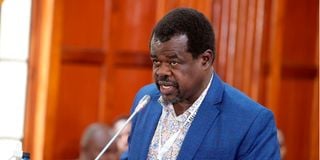Senator Omtatah files fresh suit to quash Ruto's Housing Levy

Busia Senator Okiya Omtatah.
What you need to know:
- President Ruto signed the Affordable Housing Bill 2023 into law on March 19, 2024.
- Under the new law, Kenyans will have 1.5 per cent of their monthly salary deducted.
A group led by Busia Senator Okiya Omtatah has gone to court seeking an order to quash the recently passed Affordable Housing law.
The petitioners have termed the new law as unconstitutional and illegal.
Senator Omtatah and seven other human rights activists told High Court Judge Justice Enock Chacha Mwita that the Affordable Housing law seeks to retroactively implement housing that has been declared unconstitutional.
In particular, they have challenged a section of the new law that seeks to appoint the Commissioner General of the KRA as the collector of the affordable housing levy, as well as sections 4 and 5 of the law that impose the levy.
The petitioners argue that the Commissioner General of the Kenya Revenue Authority cannot be the collector of the Affordable Housing Levy because his responsibilities are strictly limited to the affairs of the authority.
"The Commissioner General is not the KRA. It is the authority, not its Commissioner General, that is mandated by Section 5 of the KRA Act to collect and account for revenue in accordance with specified laws," the petitioners said in their submission in court.
President William Ruto signed the Affordable Housing Bill 2023 into law on March 19, 2024, paving the way for the reintroduction of the controversial housing levy deductions.
To comply with the Supreme Court ruling that declared it unconstitutional last year, the new legislation includes workers in the informal sector.
Under the new law, Kenyans will now have 1.5 per cent of their gross monthly salary deducted.
However, the petitioners have asked the court to set aside the imposition of the levy at the rate of 1.5 per cent as provided for in the Affordable Housing Act, 2024.
They are also seeking an order suspending Section 2(1) of the Affordable Housing Act, 2024, insofar as it appoints the Commissioner-General of the KRA as the collector of the Affordable Housing Levy, and Sections 4 and 5 of the Act, which impose the levy.
The petitioners are also seeking an order restraining the National Assembly and 11 other respondents from further implementing Section 60 of the Affordable Housing Act, 2024, to the extent that it seeks to retroactively address issues previously declared unconstitutional by the High Court.
Further, the petitioners want the matter referred to Chief Justice Martha Kooke because the matter raises substantial questions of law that should be heard by an uneven number of judges.
They have also asked the court to restrain the National Land Commission, the Ministry of Housing and Urban Development and any other state organ or agency from approving or using public land for the construction of houses to be privatised under the Affordable Housing Act 2024.
According to the evidence submitted to the court, the petitioners contend that no money can be lawfully raised from the public until the Affordable Housing Fund is fully operational.
Since the board of the fund has to be operational before the board can "approve the estimates of revenue and expenditure of the fund for each financial year, there was no basis to start collecting funds when the Affordable Housing Act, 2024 was signed into law", the petitioners said.
In his affidavit in support of the case, which has been certified as urgent, Senator Omtatah contends that any collection of funds must await the operationalisation of the board.
"Furthermore, such monies collected outside the law by the Commissioner General will be exposed to theft as they cannot be secured by being lawfully kept in any of the existing funds, including the Consolidated Fund," Omtatah says.
The respondents in the case are the National Assembly, Senate, Attorney General, Ministry of Lands, National Housing Corporation, Kenya Slum Upgrading, Low Cost Housing and Infrastructure Fund, Commissioner General, Kenya Revenue Authority, the Revenue Allocation Commission, the Controller of Budget, the Attorney General, the National Land Commission and the Council of Governors.
Justice Mwita directed that the writs be served on the respondents immediately as he will give further directions on 10 April 2024.
The petitioners contend that no funds can be raised under the Act unless and until Part III of the Act on the establishment and management of the Affordable Housing Fund is operationalised.
Otherwise, the national values and principles of governance in Article 10, including good governance, integrity, transparency, accountability and sustainable development, cannot be upheld.
The petitioners also state that the right to fair administrative action that is expeditious, efficient, lawful, reasonable and procedurally fair in Article 47(1) and the principles of public finance in Article 201, including openness and accountability, and the requirement that public funds be used prudently and responsibly have been violated.
They have also argued that the values and principles of public service in Article 232, including the efficient, effective and economical use of resources, transparency and accountability for administrative acts, will be negated if the contested law is implemented.
They are also seeking to establish whether the failure of the Senate to conduct and/or facilitate adequate public participation on the Affordable Housing Bill, 2023, before its enactment, invalidated the entire process of enacting the Bill into law and, therefore, the resulting Affordable Housing Act, 2024, is unconstitutional, null and void ab initio?
The petitioners state that they and the High Court have a right to protect the rights and fundamental freedoms of Kenyans and the national values and principles of governance which have been, are being and are in danger of being further violated if this controversial law is allowed to come into force.





